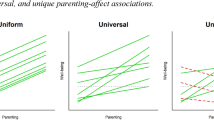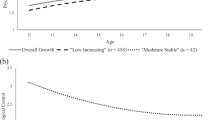Abstract
We explored mothers’ and fathers’ time spent with their adolescents and found that mothers reported spending more time with their adolescents than did fathers. Developmental patterns were found for some aspects of time involvement, with both mothers and fathers reporting higher involvement with younger adolescents. Ratings of time-spent were not associated with adolescents’ self-reported emotional/behavioral problems. Both mothers and fathers agreed that mothers had more responsibility for adolescents’ discipline, daily care, and recreational activities. Mothers and fathers reported comparable levels of satisfaction with this arrangement. Mothers, and to a lesser extent fathers, reported greater satisfaction with the division of labor when fathers showed higher levels of responsibility for adolescents’ activities. Satisfaction with the division of labor was inversely related to interparental conflict. Few differences were found based on adolescent gender for any of these variables. Results are discussed within the context of mother–child and father–child relationships and family functioning.
Similar content being viewed by others
References
Achenbach T. M., & Rescorla, L. A. (2001). Manual for the ASEBA school-age forms and profiles. Burlington, VT: University of Vermont, Research Center for Children, Youth, and Families.
Barnett, R. C., & Hyde, J. S. (2001). Women, men, work, and family. American Psychologist, 56, 781–796.
Bruck, C. S., Allen, T. D., & Spector, P. E. (2002). The relation between work–family conflict and job satisfaction: A finer-grained analysis. Journal of Vocational Behavior, 60, 336–353.
Cinnamon, R. G., & Rich, Y. (2002). Gender differences in the importance of work and family roles: Implications for work–family conflict. Sex Roles, 47, 531–541.
Coley, R. L., & Morris, J. E. (2002). Comparing father and mother reports of father involvement among low-income minority families. Journal of Marriage and Family, 64, 982–997.
Davies, P. T., & Cummings, E. M. (2006). Interparental discord, family process, and developmental psychopathology. In D. Cicchetti & D. J. Cohen (Eds.), Developmental psychopathology, Vol 3: Risk, disorder, and adaptation (2nd ed., pp. 86–128). Hoboken, NJ: Wiley.
Day, R. D., & Lamb, M. E. (Eds.). (2004). Conceptualizing and measuring father involvement. Mahwah, NJ: Lawrence Erlbaum Associates.
Duxbury, L., Higgins, C., & Lee, C. (1994). Work–family conflict: A comparison by gender, family type, and perceived control. Journal of Family Issues, 15, 449–466.
Finley, G. E., & Schwartz, S. J. (2007). Father involvement and long-term young adult outcomes: The differential contributions of divorce and gender. Family Court Review, 45, 573–587.
Freysinger, V. (1994). Leisure with children and parental satisfaction: Further evidence of a sex difference in the experience of adult roles and leisure. Journal of Leisure Research, 26, 212–226.
Goodnow, J. J. (1998). Beyond the overall balance: The significance of particular tasks and procedures for perceptions of fairness in distributions of household work. Social Justice Research, 11, 359–376.
Goodnow, J. J. (2004). The domain of work in households: A relational models approach. In N. Haslam (Ed.), Relational models theory: A contemporary overview (pp. 167–196). Mahwah, NJ: Erlbaum.
Goodnow, J. J., & Lawrence, J. A. (2001). Work contributions to the family: Developing a conceptual and research framework. In A. J. Fuligni (Ed.), Family obligation and assistance during adolescence: Contextual variations and developmental implications (pp. 5–22). San Francisco: Jossey-Bass/Pfeiffer.
Hofferth, S. L. (2003). Race/ethnic differences in father involvement in two-parent families: Culture, context, or economy? Journal of Family Issues, 24, 185–216.
Hofferth, S. L., Cabrera, N., Carlson, M., Coley, R. L., Day, R., & Schindler, H. (2007). Resident father involvement and social fathering. In S. L. Hofferth & L. M. Casper (Eds.), Handbook of measurement issues in family research (pp. 335–374). Mahwah, NJ: Erlbaum.
Hofferth, S. L., Stueve, J. L., Pleck, J., Bianchi, S., & Sayer, L. (2002). The demography of fathers: What fathers do. In C. S. Tamis-LeMonda & N. Cabrera (Eds.), Handbook of father involvement: Multidisciplinary perspectives (pp. 63–90). Mahwah, NJ: Lawrence Erlbaum Associates.
Hosley, C. A., & Montemayor, R. (1997). Fathers and adolescents. In M. E. Lamb (Ed.), The role of the father in child development (3rd ed., pp. 163–178). New York: Wiley.
Jacobs, J. N., & Kelley, M. L. (2006). Predictors of paternal involvement in childcare in dual-earner families with young children. Fathering, 4, 23–47.
Katzev, A. R., Warner, R. L., & Acock, A. C. (1994). Girls or boys?: Relationship of child gender to marital instability. Journal of Marriage and the Family, 56, 89–100.
Lamb, M. E. (2000). The history of research on father involvement: An overview. Marriage and Family Review, 29, 23–42.
Lamb, M. E., Frodi, A. M., Hwang, C. P., & Frodi, M. (1982). Varying degrees of paternal involvement in infant care: Attitudinal, behavioral correlates. In M E. Lamb (Ed.), Nontraditional families: Parenting and child development (pp. 117–137). Hillsdale, NJ: Erlbaum.
Larson, R. (1993). Finding time for fatherhood: The emotional ecology of adolescent–father interactions. New Directors for Child Development, 62, 7–25.
Larson, R., & Richards, M. (1994). Divergent realities. New York: Basic Books.
Lee, C. M., & Duxbury, L. (1998). Employed parents’ support from partners, employers, and friends. Journal of Social Psychology, 138, 303–322.
Lewis, C., & Lamb, M. E. (2003). Fathers’ influences on children’s development: The evidence from two-parent families. European Journal of Psychology of Education, 18, 211–228.
Lundberg, S., & Rose, E. (2003). Child gender and the transition to marriage. Demography, 40, 333–349.
Lytton, H., & Romney, D. M. (1991). Parents’ differential socialization of boys and girls: A meta-analysis. Psychological Bulletin, 109, 267–296.
McBride, B. A., Schoppe, S. J., & Rane, T. R. (2002). Child characteristics, parenting stress, and parental involvement: Fathers versus mothers. Journal of Marriage and Family, 64, 998–1011.
Milevsky, A., Schlechter, M., Netter, S., Keehn, D. (2007). Maternal and paternal parenting styles in adolescents: Associations with self-esteem, depression and life-satisfaction. Journal of Child and Family Studies, 16, 39–47.
Milkie, M. A., Bianchi, S. M., Mattingly, M. J., & Robinson, J. P. (2002). Gendered division of childrearing: Ideals, realities, and the relationship to parental well-being. Sex Roles, 47, 21–38.
Palkovitz, R. (2002). Involved fathering and child development: Advancing our understanding of good fathering. In C. S. Tamis-LeMonda & N. Cabrera (Eds.), Handbook of father involvement: Multidisciplinary perspectives (pp. 119–140). Mahwah, NJ: Lawrence Erlbaum Associates.
Parke, R. D. (2000). Father involvement: A developmental psychological perspective. Marriage and Family Review, 29, 43–58.
Parke, R. D., McDowell, D. J., Kim, M., Killian, C., Dennis, J., Flyr, M. L., & Wild, M. N. (2002). Fathers’ contributions to children’s peer relationships. In C. S. Tamis-LeMonda & N. Cabrera (Eds.), Handbook of father involvement: Multidisciplinary perspectives (pp. 141–167). Mahwah, NJ: Lawrence Erlbaum Associates.
Phares, V. (1996). Fathers and developmental psychopathology. New York: Wiley.
Pleck, J. H., & Masciadrelli, B. P. (2004). Paternal involvement by U.S. residential fathers: Levels, sources, and consequences. In M. E. Lamb (Ed.), The role of the father in child development (4th ed., pp. 222–271). New York: Wiley.
Plunkett, S. W., Henry, C. S., Robinson, L. C., Behnke, A., & Falcon, P. C. (2007). Adolescent perceptions of parental behaviors, adolescent self-esteem, and adolescent depressed mood. Journal of Child and Family Studies, 16, 760–772.
Porter, B., & O’Leary, K. D. (1980). Marital discord and childhood behavior problems. Journal of Abnormal Child Psychology, 8, 287–295.
Seltzer, J. A., & Brandreth, Y. (1995). What fathers say about involvement with children after separation. In W. Marsiglio (Ed.), Fatherhood: Contemporary theory, research, and social policy (pp. 166–192). Thousand Oaks, CA: Sage Publications.
Whelan, T. A., & Lally, C. M. E. (2002). Paternal commitment and father’s quality of life. Journal of Family Studies, 8, 181–196.
Youniss, J., & Smollar, J. (1985). Adolescent relations with mothers, fathers, and friends. Chicago: The University of Chicago Press.
Author information
Authors and Affiliations
Corresponding author
Rights and permissions
About this article
Cite this article
Phares, V., Fields, S. & Kamboukos, D. Fathers’ and Mothers’ Involvement with Their Adolescents. J Child Fam Stud 18, 1–9 (2009). https://doi.org/10.1007/s10826-008-9200-7
Received:
Accepted:
Published:
Issue Date:
DOI: https://doi.org/10.1007/s10826-008-9200-7




